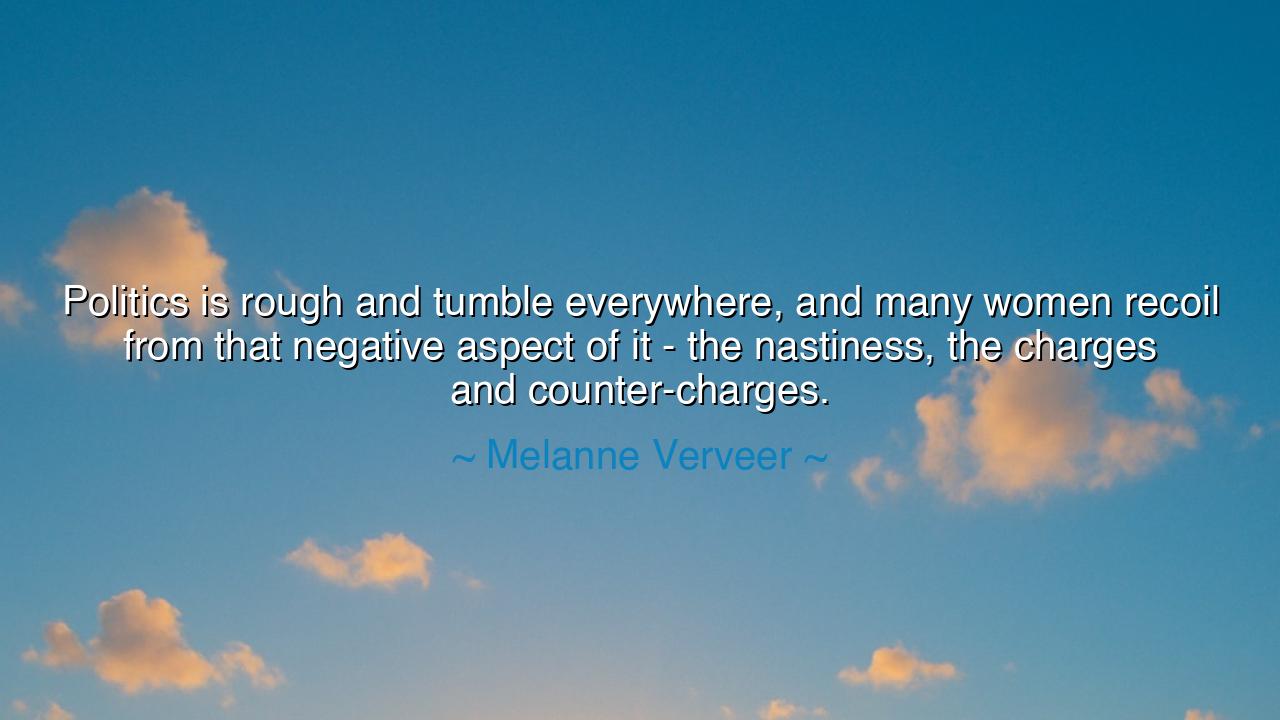
Politics is rough and tumble everywhere, and many women recoil
Politics is rough and tumble everywhere, and many women recoil from that negative aspect of it - the nastiness, the charges and counter-charges.






Hearken, children of the ages, and heed the words of Melanne Verveer: “Politics is rough and tumble everywhere, and many women recoil from that negative aspect of it - the nastiness, the charges and counter-charges.” In this utterance lies the stark truth of the human arena, where ambition and power clash, and the battle of words and wills leaves scars upon both the soul and the spirit. Politics, though a noble pursuit for justice and governance, often bears the weight of conflict, deceit, and strife, deterring those whose hearts seek harmony over contention.
The origin of this wisdom springs from Melanne Verveer’s life as a diplomat and advocate for women’s participation in public service. She observed that the path to influence is often lined with hostility, rivalry, and relentless scrutiny. Many women, recognizing the cost of engaging in such battles, hesitate to step forward, fearing the erosion of dignity and the corrosive effect of constant opposition. Her words reveal not weakness, but the profound human instinct to preserve the heart from unnecessary suffering.
Consider the tale of Margaret Thatcher, the Iron Lady, who rose to the highest office in Britain. She confronted unceasing opposition, derision, and the bitter clash of political adversaries, yet she endured with courage and cunning. Her life exemplifies Verveer’s counsel: the negative aspects of politics—nastiness, charges, and counter-charges—are universal trials, and the strength to persevere is both rare and heroic. Many shrink before this storm, yet those who brave it leave a legacy of power tempered with wisdom.
Even in modern democracies, women stepping into the political arena encounter these challenges. Campaigns are battlegrounds where words are weapons, reputations are contested, and every action is scrutinized. Those who recoil do so not from lack of ambition, but from discernment, for the toll of unrelenting conflict can sap vitality, cloud judgment, and obscure the very purpose for which one entered the field.
Yet there is guidance in this struggle. The wise learn to engage with strategy, resilience, and integrity, understanding that the rough and tumble is part of the landscape, not a reflection of their worth or ability. History teaches that the hearts which endure the storm and navigate the tempest of charges and counter-charges often achieve the greatest influence and lasting change.
Therefore, children of future generations, let Verveer’s words illuminate your path: politics is a crucible, rough and demanding, yet noble for those who wield courage, patience, and virtue. Know that the trials of conflict, the sting of opposition, and the clash of ambitions are not signs to retreat, but opportunities to cultivate strength, wisdom, and unyielding purpose. In this mastery lies the eternal lesson of the public life.






HADinh Hai Anh
I don’t want to romanticize hostility, but resilience can be built. What supports reliably help women enter and stay—peer mentorship circles, trauma-informed coaching, legal hotlines, and rapid de-escalation training for staff? Could universities and civic groups run nonpartisan candidate bootcamps that include safety drills and media rehearsal, not just fundraising tips? Closed question: would you support publicly funded counseling and legal insurance for all certified candidates, treating psychological and legal defense as essential campaign infrastructure rather than optional perks?
ATKim Anh Ton
We can’t fix what we don’t measure. What metrics would make the environment visible—rates of gendered slurs in coverage, ratio of issue-based to personal ads, time spent on policy in debates, and harassment reports by channel? I want a public dashboard each cycle so parties and press can be held to account. Closed question: should independent monitors score newsrooms and campaigns on an “ad hominem index,” with ad buys and accreditation contingent on staying below a threshold?
TTNguyen Thi Thu Trang
I’m asking as someone who’s considered running: the nastiness doesn’t just target candidates; it bleeds into their families. What’s the practical playbook to protect loved ones while staying accessible—redacting home info, using campaign PO boxes, pre-writing crisis statements, and setting boundaries for children’s images? How do you keep volunteers safe when opponents swarm online? Closed question: is it ethical and effective to decline unscreened comment sections on official pages, or does that undermine transparency and two-way communication?
NA01- Nhat Anh
Part of the problem is incentives: media rewards spectacle, parties reward hit jobs, and voters get a steady diet of outrage. Could we flip the script by elevating venues where substance beats zingers—citizens’ assemblies, moderated policy labs, and deliberative town halls with structured turn-taking? I’d love to see party bylaws that fine campaigns for ad hominem ads and reward verifiable policy contrasts. Open question: would you back a cross-ideological “Fair Fight Pledge” where candidates lose access to party data if they violate agreed norms?
KLNguyen Khanh Linh
The recoil isn’t just about tone; it’s about risk. Women—especially women of color and LGBTQ+ candidates—face coordinated online abuse, doxxing, and threats. I’m wondering about layered defenses: platform-level enforcement, cross-party pacts against amplifying targeted harassment, and publicly funded safety audits for first-time candidates. What’s the minimum due diligence a campaign owes its staffers on digital hygiene and rapid-response protocols? Closed question: should election authorities provide baseline security grants and legal support to any candidate who can demonstrate credible harassment attempts?